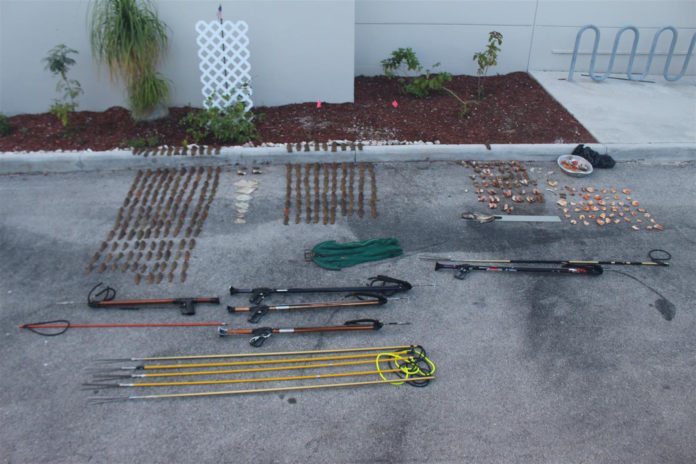What happens to the confiscated lobster? If it is found in the possession of a commercial fisherman who has followed proper handling, it is sold to a fish house and the money is held in escrow pending the outcome of the trial. If it’s been in the hands of amateur lobsters, who most likely don’t handle the seafood properly by keeping it sanitary and chilled, it is disposed of back into the wild.
The seven men arrested on July 10 were charged with felonies for their out of season, undersized, speared catch. CONTRIBUTED
State’s attorney deals harshly with those who violate the lobster law
On July 10, seven men were arrested for taking 320 spiny lobster — of which 226 were undersized — before the start of season in the Middle Keys. It is perhaps one of the most egregious cases of resource theft the Keys have ever experienced.
“Unfortunately, these individuals chose to take advantage of our valuable saltwater resources that we are so proud of in the keys,” said Major Alfredo Escanio, Fish and Wildlife Commission Regional Commander for the area. “They are also stealing from law-abiding residents and visitors who are looking forward to taking lobster during the two-day sport season.” Sport season begins at 12:01 a.m. on July 26 to midnight on July 27.
Just a week before, a Pembroke Pines man was found with 15 undersized lobster, again out of season. On June 27, two Homestead men were found with 17 undersized lobster, still out of season. On June 24, a man was caught with three undersized, speared (it is illegal to spear the creatures) lobster onboard. This is only a very partial count of the people caught in Monroe County, charged with violating the laws governing lobster catch.
What happens to these people? In Monroe County the State’s Attorney office is going to throw the book at the offenders. That first case, involving the seven men with hundreds of lobsters? Those men have all been charged with two third-degree felonies apiece, 586 first-degree misdemeanors for the out-of-season wrung tails, 14 second-degree misdemeanors for spearing the lobster, plus taking out-of-season stone crab, also undersized, and reef fish not landed in whole condition. The captain of the vessel was additionally charged with a second-degree misdemeanor for an undersize black grouper.
State Attorney Dennis Ward and his staff of attorneys pursue these cases vigorously.
“It’s pretty simple. You get six a day of a certain size. If you get more than that, you’re going to jail. If they are undersize, you are going to jail. If they are out of season you are going to jail,” he said.
Perhaps the only exception to the rule is if violators are found in possession of fewer than four extra, or out of season or wrung tails. Those persons may be offered pre-trial intervention provided they have no criminal background.
Anything more than that, and violators will face second-degree misdemeanors that carry a maximum penalty of 60 days in jail and a $500 fine. That could also mean court costs, fines, community service, writing out the regulation longhand, and classes taught by FWC.
Violators caught with more than 25 out of season lobster, or wrung tails, can be charged with a first degree misdemeanor that carries a maximum penalty of a year in jail and a $1,000 fine. Frequent offenders with this many illegal lobster could have the charges upped to a third degree felony with mandatory jail time and penalties.
Those seven guys? If convicted they face a maximum penalty of five years in prison, a $5,000 fine and mandatory civil penalties.
So … are a couple extra lobster really worth it?

























